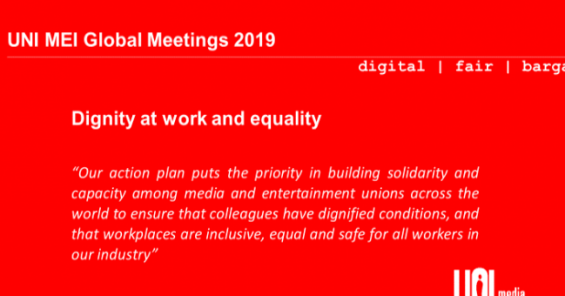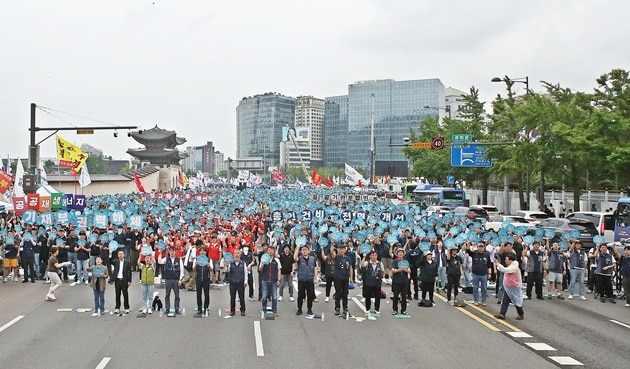More than 70 leaders of media and entertainment unions from across the world met for the meetings of the global and European Executive Committees of UNI MEI in Madrid from 14 to 18 October.
The Committees reviewed the campaigns, organising and capacity building projects and discussed the priorities for the next twelve months. While organising remains the top priority for action, UNI MEI has expanded its work on dignity and equality at work.
UNI MEI President Matthew D. Loeb said, “our action plan puts the priority in building solidarity and capacity among media and entertainment unions across the world to ensure that colleagues have dignified conditions, and that workplaces are inclusive, equal and safe for all workers in our industry. This is a long-term commitment and all member unions of UNI MEI are in this together!”
While the promotion of gender equality is mainstreamed in all projects, UNI MEI has been carrying out specific actions to provide capacity building for unions in developing gender equality policies within unions and at work. For example, a project of FIA and UNI MEI provides a series of capacity building seminars for women union leaders from Latin American audiovisual trade unions. In Europe, both social dialogues committees, in the audiovisual and the live performance sectors pursue joint employer-union projects on gender equality and the prevention of violence at work, including sexual harassment. At global level, UNI MEI, FIA and FIM are cooperating with the ILO who is undertaking a survey on sexual harassment in the media and entertainment sector. This survey is implemented just months after the adoption of the ILO convention to combat violence and harassment in the world of work.
Margherita Licata of the ILO presented the convention and the survey during the meeting of the UNI MEI Executive Committee of UNI MEI and informed members of the implementation process as well as the measures that UN member states are to put in place to effectively combat violence and harassment. The UNI MEI Executive Committee adopted a recommendation to include in UNI MEI’s regional and global work a focus on the implementation of the convention.
In her address to the global Executive Committee, UNI Deputy General Secretary Alke Boessiger emphasised UNI’s commitment to work with governments and employers towards the implementation the ILO convention and to support affiliates in across all sectors in their efforts to combat violence and harassment at work.
“Gender-based violence is not about an individual but rather a systemic evil. Victims are targeted for many different reasons – their gender, gender identity, sexual orientation, class or race. It undermines workers and makes them afraid to speak out because they know it could result in them losing their job or being further victimised. This power imbalance weakens workers’ ability to speak out about other pressing issues on the job, and it creates a sense of impunity for employers that further compounds a culture of violence and harassment.”
“We need to bring about change and end the culture of impunity, fear and violence that rein in too many workplaces. The convention sets for the first time in history a global standard to combat violence and harassment. The widest and most coherent implementation of the convention is a priority for UNI. We have to make it happen!” Boessiger added.
The global meetings included also a specific workshop on working conditions in film and TV production that is part of a two-year project on promoting dignity and preventing violence in film & TV production. The workshop allowed affiliates to make further progress towards establishing a code of conduct on dignity at work in international co-productions. During the meetings, a first exchange with FIAPF, the International Federation of Film Producers’ Association about the prospect of a dialogue between UNI MEI and the international producers’ associations regarding welfare conditions and the prevention of violence at work took place. This first constructive exchange will be followed up with a discussion paper that UNI MEI will submit to FIAPF and CEPI as basis for discussion in the future dialogue meetings. During the Berlin Film Festival 2020, the UNI MEI global working group on film and TV production will meet on 25 and 26 February to continue this important work.
The UNI MEI global and European committee meetings adopted work priorities for 2020 that mark the last cycle of the action plan 2015-2020 “digital | fair | bargain” adopted by the UNI MEI General Assembly in 2015. The next General Assembly is scheduled to place during the last week of February 2021 in Bangkok, Thailand.


